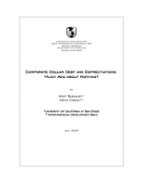Corporate Dollar Debt and Depreciations: Much Ado about Nothing?
Date
Jul 2005
Much has been written recently about the problems for emerging markets that might result from a mismatch between foreign-currency denominated liabilities and assets (or income flows) denominated in local currency. In particular, several models, developed in the aftermath of financial crises of the late 1990s, suggest that the expansion in the "peso" value of "dollar" liabilities resulting from a devaluation could, via a net worth effect, offset the expansionary competitiveness effect. Assessing which effect dominates is ultimately an empirical matter. In this vein, this paper constructs a new database with accounting information (including the currency composition of liabilities) for over 450 non-financial firms in five Latin American countries. The authors estimate, at the firm level, the reduced-form effect on investment of holding foreign-currency-denominated debt during an exchange-rate realignment. It is consistently found that, contrary to the predicted sign of the net-worth effect, firms holding more dollar debt do not invest less than their counterparts in the aftermath of a depreciation. The paper shows that this result is due to firms matching the currency denomination of their liabilities with the exchange-rate sensitivity of their profits. Because of this matching, the negative balance-sheet effects of a depreciation on firms holding dollar debt are offset by the larger competitiveness gains of these firms.



